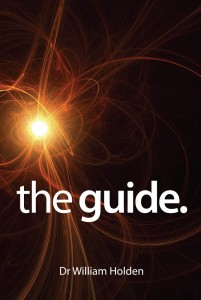
 Why writers need help (and where to find some)
Why writers need help (and where to find some)
Back in the day, when I used to coach writers (before I discovered that coaching and writing were inimical, so if I coached, I didn’t write!) it came as no surprise to me that the main problems that writers had were not with their writing.
They thought they had writing problems, of course, or they wouldn’t have hired a writing coach, but what they had were the same, often apparently insuperable, meta-problems that send all kinds of people to all kinds of counselling. The only difference for them was that their performance anxiety was related to writing, not golf or passing their driving test or holding their marriage together.
And that’s why I was interested to receive a review copy of The Guide by Dr William Holden. Dr Holden has, amongst other things, been involved in sports performance coaching, and that’s an area from which I draw a lot of the techniques that I use in workshops with writers. Basically, these meta-problems usually relate to the way people see themselves (self-esteem) and they way they see the world (the Hobbesian view of it as being nasty and brutish tends to predominate) and I’m always looking for good books that explain where people are now, and show them how to get to where they’d rather be.
Seriously though, most self-help books absolutely stink. I think they stink for everybody because they are patronising and bland but they also stink particularly badly for writers because they are appallingly written tomes of turgid prose, packed with jargon and supposedly illuminated by bullet points but actually obfuscated by them.
As you can tell, my view of the self-help industry, as it presents itself between book covers, is pretty low. However, I was willing to give The Guide a read, and I was impressed by two simple innovations that make it a much more palatable tool. First, it neither seeks to seduce or exhort the reader, because it’s not about the reader, it’s about somebody else entirely. He’s called Paul, and in following his journey we don’t get the finger-pointing that is such an unattractive feature of self-help books addressed to you, the reader (are you a woman who eats too much, are you a man without an emotional life? Why would anybody read further when addressed in such terms, I always wonder?) However, in learning what Paul learns, the reader gets plenty of opportunity to identify with his problems and understand the solutions.
Second, it’s a story! Wow! It’s not much of a story – it’s no epic saga of warriorhood, but it is actually a narrative, not a list of things to do to make yourself a better mother/lover/driver/salesman, and that makes it a much more enjoyable and attractive proposition for the reader to work through the book.
Of course, reading a book and putting what it tells in you into practice are two different processes, but my gut feeling is that Dr Holden has achieved what so many self-help authors never do; he’s applied his own principles to the book he’s written and achieved something quite outside, and quite beyond, the average.
There are things I would pick bones with: I hate the fact that the goal-setting section contains a template for the reader to use to write their goals, which drops the book back into the same morass as all the other self-help tomes; and I don’t buy into the mystic stuff at all, but I don’t have to, and you don’t have to, because it’s not necessary to believe in any of that stuff to gain the benefits of this well-explained and attractive guide to changing your thinking for the better.
Overall, if you’re going to buy a self-help book for Christmas, I’d say this one is the best I’ve read for a very long time, and it could even change your life ….


2 Comments
Louise Halvardsson
16th October 2009thanks for the tip! yeah you should take self-help books with a pinch of salt … but what really changed MY life and my life as a writer was Julia Cameron’s the Artist’s way and the follow up Vein of Gold.
Kip de Moll
1st December 2009Thanks, Kay, i’ll look for that one. your review gives me courage for the writiing I’ve been doing over at my blog and thinking the essays could be turned into a book that might have value for others: the Wounded Healer.